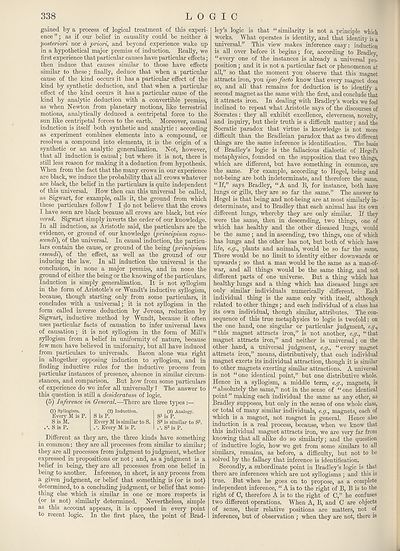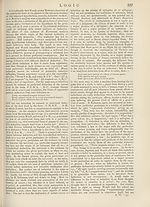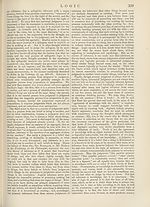New volumes of the Encyclopædia Britannica > Volume 30, K-MOR
(368) Page 338
Download files
Complete book:
Individual page:
Thumbnail gallery: Grid view | List view

338
LOGIC
gained by a process of logical treatment of this experi¬
ence ”; as if our belief in causality could be neither a
'posteriori nor a priori, and beyond experience wake up
in a hypothetical major premiss of induction. Really, we
first experience that particular causes have particular effects;
then induce that causes similar to those have effects
similar to these; finally, deduce that when a particular
cause of the kind occurs it has a particular effect of the
kind by synthetic deduction, and that when a particular
effect of the kind occurs it has a particular cause of the
kind by analytic deduction with a convertible premiss,
as when Newton from planetary motions, like terrestrial
motions, analytically deduced a centripetal force to the
sun like centripetal forces to the earth. Moreover, causal
induction is itself both synthetic and analytic : according
as experiment combines elements into a compound, or
resolves a compound into elements, it is the origin of a
synthetic or an analytic generalization. Not, however,
that all induction is causal; but where it is not, there is
still less reason for making it a deduction from hypothesis.
When from the fact that the many crows in our experience
are black, we induce the probability that all crows whatever
are black, the belief in the particulars is quite independent
of this universal. How then can this universal be called,
as Sigwart, for example, calls it, the ground from which
these particulars follow ? I do not believe that the crows
I have seen are black because all crows are black, but vice
versd. Sigwart simply inverts the order of our knowledge.
In all induction, as Aristotle said, the particulars are the
evidence, or ground of our knowledge (principiwn cogno-
scendi), of the universal. In causal induction, the particu¬
lars contain the cause, or ground of the being (principium
essendi), of the effect, as well as the ground of our
inducing the law. In all induction the universal is the
conclusion, in none a major premiss, and in none the
ground of either the being or the knowing of the particulars.
Induction is simply generalization. It is not syllogism
in the form of Aristotle’s or Wundt’s inductive syllogism,
because, though starting only from some particulars, it
concludes with a universal; it is not syllogism in the
form called inverse deduction by Jevons, reduction by
Sigwart, inductive method by Wundt, because it often
uses particular facts of causation to infer universal laws
of causation; it is not syllogism in the form of Mill’s
syllogism from a belief in uniformity of nature, because
few men have believed in uniformity, but all have induced
from particulars to universals. Bacon alone was right
in altogether opposing induction to syllogism, and in
finding inductive rules for the inductive process from
particular instances of presence, absence in similar circum¬
stances, and comparison. But how from some particulars
of experience do we infer all universally 1 The answer to
this question is still a desideratum of logic.
(5) Inference in General.—There are three types :—
(1) Syllogism.
Every M is P.
S is M.
Sis P.
(2) Induction.
Sis P.
Every M is similar to
. \ Every M is P.
(3) Analogy.
51 is P.
52 is similar to S1.
S2 is P.
Different as they are, the three kinds have something
in common: they are all processes from similar to similar;
they are all processes from judgment to judgment, whether
expressed in propositions or not; and, as a judgment is a
belief in being, they are all processes from one belief in
being to another. Inference, in short, is any process from
a given judgment, or belief that something is (or is not)
determined, to a concluding judgment, or belief that some¬
thing else which is similar in one or more respects is
(or is. not) similarly determined. Nevertheless, simple
as this account appears, it is opposed in every point
to recent logic. In the first place, the point of Brad¬
ley’s logic is that “similarity is not a principle which
works. What operates is identity, and that identity is a
universal.” This view makes inference easy: induction
is all over before it begins; for, according to Bradley,
“every one of the instances is already a universal pro¬
position ; and it is not a particular fact or phenomenon at
all,” so that the moment you observe that this magnet
attracts iron, you ipso facto know that every magnet does
so, and all that remains for deduction is to identify a
second magnet as the same with the first, and conclude that
it attracts iron. In dealing with Bradley’s works we feel
inclined to repeat what Aristotle says of the discourses of
Socrates: they all exhibit excellence, cleverness, novelty,
and inquiry, but their truth is a difficult matter; and the
Socratic paradox that virtue is knowledge is not more
difficult than the Bradleian paradox that as two different
things are the same inference is identification. The basis
of Bradley’s logic is the fallacious dialectic of Hegel’s
metaphysics, founded on the supposition that two things,
which are different, but have something in common, are
the same. For example, according to Hegel, being and
not-being are both indeterminate, and therefore the same.
“If,” says Bradley, “A and B, for instance, both have
lungs or gills, they are so far the same.” The answer to
Hegel is that being and not-being are at most similarly in¬
determinate, and to Bradley that each animal has its own
different lungs, whereby they are only similar. If they
were the same, then in descending, two things, one of
which has healthy and the other diseased lungs, would
be the same; and in ascending, two things, one of which
has lungs and the other has not, but both of which have
life, e.g., plants and animals, would be so far the same.
There would be no limit to identity either downwards or
upwards; so that a man would be the same as a man-of-
war, and all things would be the same thing, and not
different parts of one universe. But a thing which has
healthy lungs and a thing which has diseased lungs are
only similar individuals numerically different. Each
individual thing is the same only with itself, although
related to other things; and each individual of a class has
its own individual, though similar, attributes. The con¬
sequence of this true metaphysics to logic is twofold: on
the one hand, one singular or particular judgment, e.g.,
“this magnet attracts iron,” is not another, e.g., “that
magnet attracts iron,” and neither is universal; on the
other hand, a universal judgment, e.g., “ every magnet
attracts iron,” means, distributively, that each individual
magnet exerts its individual attraction, though it is similar
to other magnets exerting similar attractions. A universal
is not “one identical point,” but one distributive whole.
Hence in a syllogism, a middle term, e.g., magnets, is
“ absolutely the same,” not in the sense of “ one identical
point ” making each individual the same as any other, as
Bradley supposes, but only in the sense of one whole class,
or total of many similar individuals, e.g., magnets, each of
which is a magnet, not magnet in general. Hence also
induction is a real process, because, when we know that
this individual magnet attracts iron, we are very far from
knowing that all alike do so similarly; and the question
of inductive logic, how we get from some similars to all
similars, remains, as before, a difficulty, but not to be
solved by the fallacy that inference is identification.
Secondly, a subordinate point in Bradley’s logic is that
there are inferences which are not syllogisms ; and this is
true. But when he goes on to propose, as a complete
independent inference, “ A is to the right of B, B is to the
right of C, therefore A is to the right of C,” he confuses
two different operations. When A, B, and C are objects
of sense, their relative positions are matters, not of
inference, but of observation ; when they are not, there is
LOGIC
gained by a process of logical treatment of this experi¬
ence ”; as if our belief in causality could be neither a
'posteriori nor a priori, and beyond experience wake up
in a hypothetical major premiss of induction. Really, we
first experience that particular causes have particular effects;
then induce that causes similar to those have effects
similar to these; finally, deduce that when a particular
cause of the kind occurs it has a particular effect of the
kind by synthetic deduction, and that when a particular
effect of the kind occurs it has a particular cause of the
kind by analytic deduction with a convertible premiss,
as when Newton from planetary motions, like terrestrial
motions, analytically deduced a centripetal force to the
sun like centripetal forces to the earth. Moreover, causal
induction is itself both synthetic and analytic : according
as experiment combines elements into a compound, or
resolves a compound into elements, it is the origin of a
synthetic or an analytic generalization. Not, however,
that all induction is causal; but where it is not, there is
still less reason for making it a deduction from hypothesis.
When from the fact that the many crows in our experience
are black, we induce the probability that all crows whatever
are black, the belief in the particulars is quite independent
of this universal. How then can this universal be called,
as Sigwart, for example, calls it, the ground from which
these particulars follow ? I do not believe that the crows
I have seen are black because all crows are black, but vice
versd. Sigwart simply inverts the order of our knowledge.
In all induction, as Aristotle said, the particulars are the
evidence, or ground of our knowledge (principiwn cogno-
scendi), of the universal. In causal induction, the particu¬
lars contain the cause, or ground of the being (principium
essendi), of the effect, as well as the ground of our
inducing the law. In all induction the universal is the
conclusion, in none a major premiss, and in none the
ground of either the being or the knowing of the particulars.
Induction is simply generalization. It is not syllogism
in the form of Aristotle’s or Wundt’s inductive syllogism,
because, though starting only from some particulars, it
concludes with a universal; it is not syllogism in the
form called inverse deduction by Jevons, reduction by
Sigwart, inductive method by Wundt, because it often
uses particular facts of causation to infer universal laws
of causation; it is not syllogism in the form of Mill’s
syllogism from a belief in uniformity of nature, because
few men have believed in uniformity, but all have induced
from particulars to universals. Bacon alone was right
in altogether opposing induction to syllogism, and in
finding inductive rules for the inductive process from
particular instances of presence, absence in similar circum¬
stances, and comparison. But how from some particulars
of experience do we infer all universally 1 The answer to
this question is still a desideratum of logic.
(5) Inference in General.—There are three types :—
(1) Syllogism.
Every M is P.
S is M.
Sis P.
(2) Induction.
Sis P.
Every M is similar to
. \ Every M is P.
(3) Analogy.
51 is P.
52 is similar to S1.
S2 is P.
Different as they are, the three kinds have something
in common: they are all processes from similar to similar;
they are all processes from judgment to judgment, whether
expressed in propositions or not; and, as a judgment is a
belief in being, they are all processes from one belief in
being to another. Inference, in short, is any process from
a given judgment, or belief that something is (or is not)
determined, to a concluding judgment, or belief that some¬
thing else which is similar in one or more respects is
(or is. not) similarly determined. Nevertheless, simple
as this account appears, it is opposed in every point
to recent logic. In the first place, the point of Brad¬
ley’s logic is that “similarity is not a principle which
works. What operates is identity, and that identity is a
universal.” This view makes inference easy: induction
is all over before it begins; for, according to Bradley,
“every one of the instances is already a universal pro¬
position ; and it is not a particular fact or phenomenon at
all,” so that the moment you observe that this magnet
attracts iron, you ipso facto know that every magnet does
so, and all that remains for deduction is to identify a
second magnet as the same with the first, and conclude that
it attracts iron. In dealing with Bradley’s works we feel
inclined to repeat what Aristotle says of the discourses of
Socrates: they all exhibit excellence, cleverness, novelty,
and inquiry, but their truth is a difficult matter; and the
Socratic paradox that virtue is knowledge is not more
difficult than the Bradleian paradox that as two different
things are the same inference is identification. The basis
of Bradley’s logic is the fallacious dialectic of Hegel’s
metaphysics, founded on the supposition that two things,
which are different, but have something in common, are
the same. For example, according to Hegel, being and
not-being are both indeterminate, and therefore the same.
“If,” says Bradley, “A and B, for instance, both have
lungs or gills, they are so far the same.” The answer to
Hegel is that being and not-being are at most similarly in¬
determinate, and to Bradley that each animal has its own
different lungs, whereby they are only similar. If they
were the same, then in descending, two things, one of
which has healthy and the other diseased lungs, would
be the same; and in ascending, two things, one of which
has lungs and the other has not, but both of which have
life, e.g., plants and animals, would be so far the same.
There would be no limit to identity either downwards or
upwards; so that a man would be the same as a man-of-
war, and all things would be the same thing, and not
different parts of one universe. But a thing which has
healthy lungs and a thing which has diseased lungs are
only similar individuals numerically different. Each
individual thing is the same only with itself, although
related to other things; and each individual of a class has
its own individual, though similar, attributes. The con¬
sequence of this true metaphysics to logic is twofold: on
the one hand, one singular or particular judgment, e.g.,
“this magnet attracts iron,” is not another, e.g., “that
magnet attracts iron,” and neither is universal; on the
other hand, a universal judgment, e.g., “ every magnet
attracts iron,” means, distributively, that each individual
magnet exerts its individual attraction, though it is similar
to other magnets exerting similar attractions. A universal
is not “one identical point,” but one distributive whole.
Hence in a syllogism, a middle term, e.g., magnets, is
“ absolutely the same,” not in the sense of “ one identical
point ” making each individual the same as any other, as
Bradley supposes, but only in the sense of one whole class,
or total of many similar individuals, e.g., magnets, each of
which is a magnet, not magnet in general. Hence also
induction is a real process, because, when we know that
this individual magnet attracts iron, we are very far from
knowing that all alike do so similarly; and the question
of inductive logic, how we get from some similars to all
similars, remains, as before, a difficulty, but not to be
solved by the fallacy that inference is identification.
Secondly, a subordinate point in Bradley’s logic is that
there are inferences which are not syllogisms ; and this is
true. But when he goes on to propose, as a complete
independent inference, “ A is to the right of B, B is to the
right of C, therefore A is to the right of C,” he confuses
two different operations. When A, B, and C are objects
of sense, their relative positions are matters, not of
inference, but of observation ; when they are not, there is
Set display mode to:
![]() Universal Viewer |
Universal Viewer | ![]() Mirador |
Large image | Transcription
Mirador |
Large image | Transcription
Images and transcriptions on this page, including medium image downloads, may be used under the Creative Commons Attribution 4.0 International Licence unless otherwise stated. ![]()
| Encyclopaedia Britannica > New volumes of the Encyclopædia Britannica > Volume 30, K-MOR > (368) Page 338 |
|---|
| Permanent URL | https://digital.nls.uk/193572285 |
|---|
| Attribution and copyright: |
|
|---|---|
| Shelfmark | EB.18 |
|---|---|
| Description | Ten editions of 'Encyclopaedia Britannica', issued from 1768-1903, in 231 volumes. Originally issued in 100 weekly parts (3 volumes) between 1768 and 1771 by publishers: Colin Macfarquhar and Andrew Bell (Edinburgh); editor: William Smellie: engraver: Andrew Bell. Expanded editions in the 19th century featured more volumes and contributions from leading experts in their fields. Managed and published in Edinburgh up to the 9th edition (25 volumes, from 1875-1889); the 10th edition (1902-1903) re-issued the 9th edition, with 11 supplementary volumes. |
|---|---|
| Additional NLS resources: |
|

